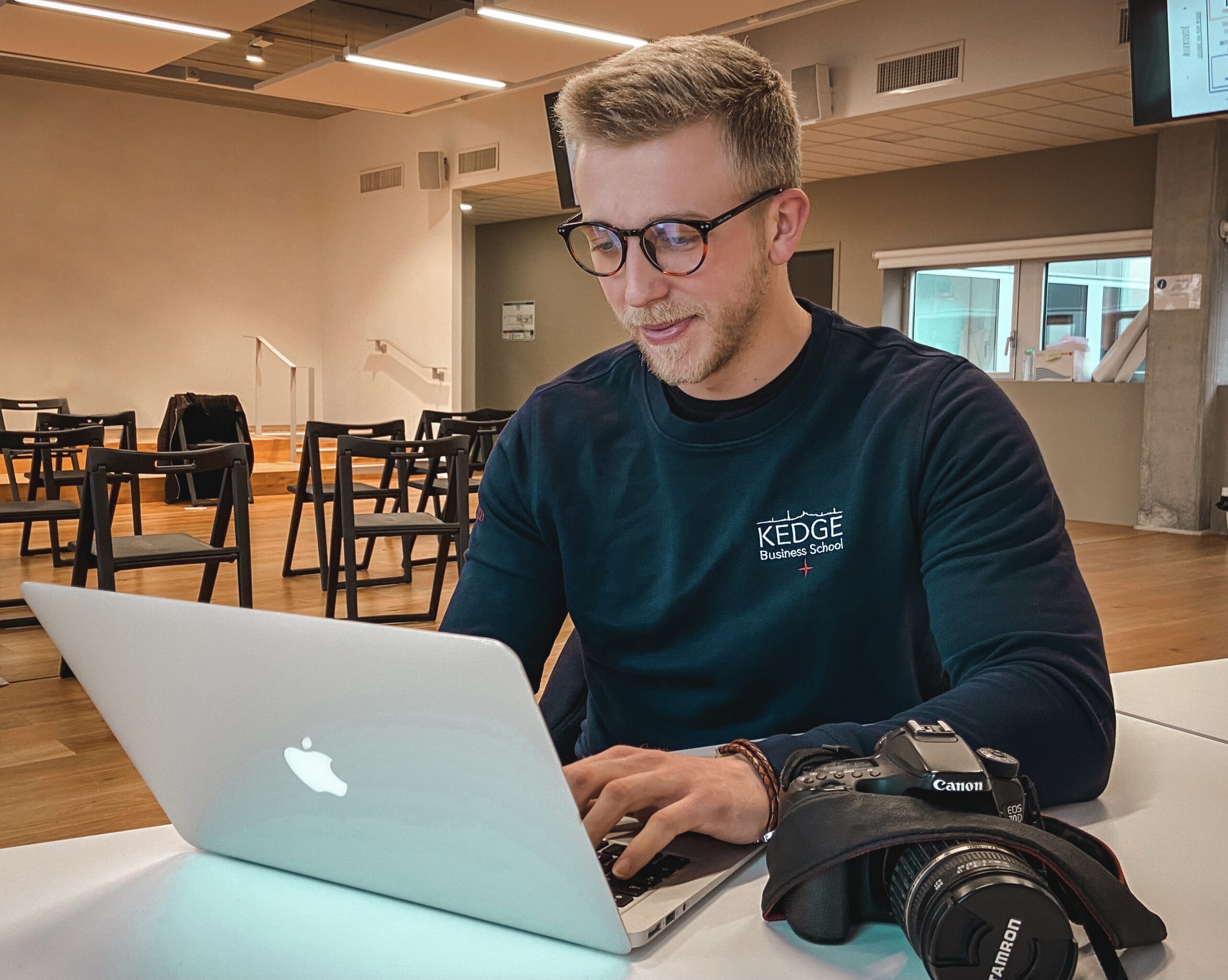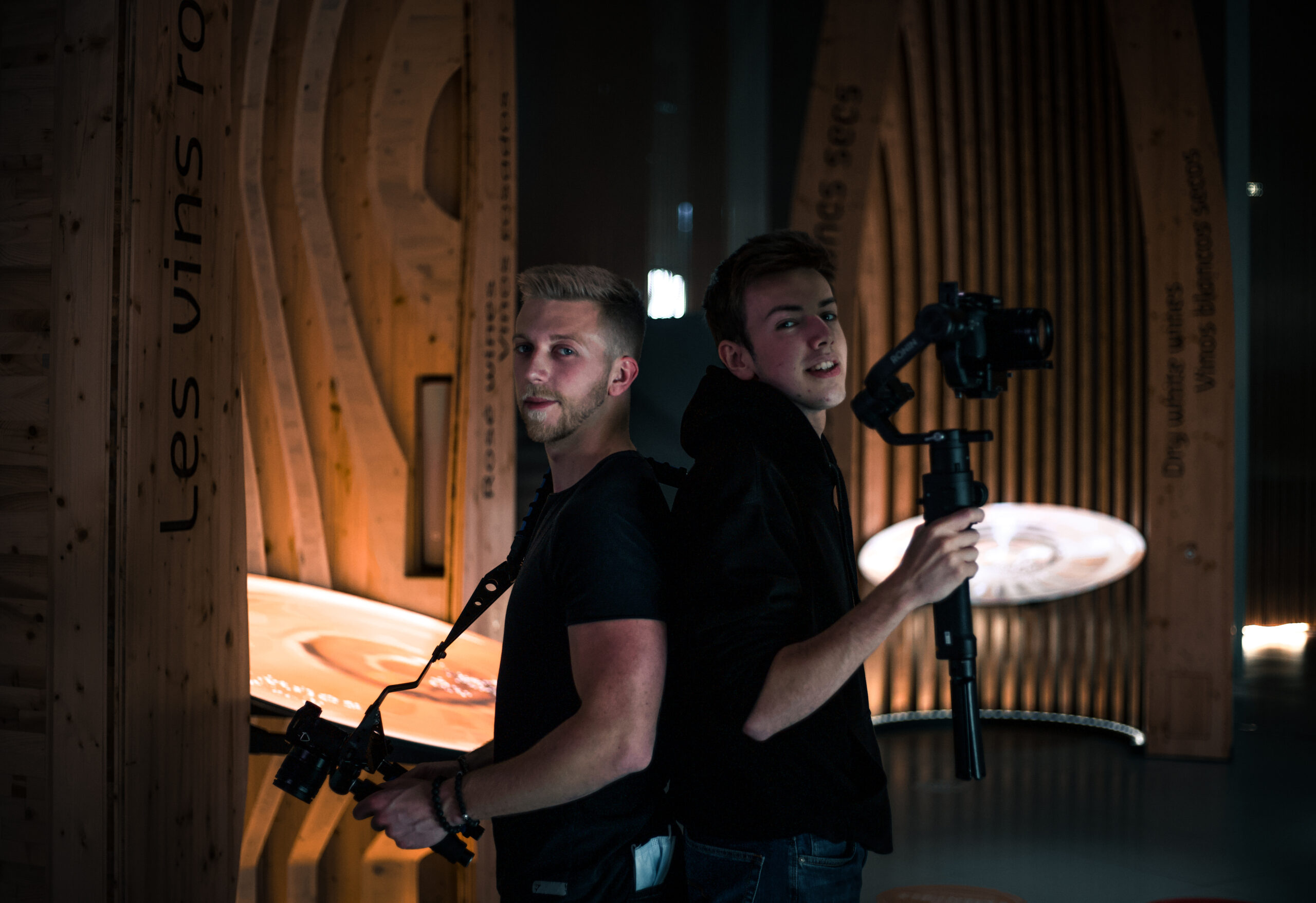Gap year, photography, professional projects… Maxime Banlier, a work-study student at KEDGE, joined the school via the AST competitions. He looks back on his career for us and tells us about his atypical path to the world of management!
The beginnings of Maxime Banlier
What did you want to do when you were young?
I have a background that can be compared to a business background: I have a dad who works in the automobile industry, he is someone who inspired me a lot and who inspires me a lot in my life. Originally, I told myself that I would work in sales, because I loved human contact and customer contact in general.
Why did you go to an IAE?
I found that it was perhaps limiting to do a BTS, very technical (…) and I thought that I could try a very general study adventure. I wanted, in addition to that, to know the university, so I enrolled in IAE, in La Rochelle, to obtain my license. I always had this commercial perspective in mind: I did internships in the automobile industry and I really flourished there.
If the subject interests you: The Twitter ranking of IAE 2022
Maxime Banlier’s time at Peugeot
Why did you take a break from your studies?
At the end of the IAE, you must have the “IAE score”, a competition which is very similar to the TAGE-MAGE. I got it, but I didn’t know which master’s degree I was interested in, so I told myself it was better to make a thoughtful choice rather than a default choice. And having contacts in the automotive industry, interpersonal sales skills and product knowledge, I told myself I was going to take a break. So I did event sales – fairs, customer events – for Peugeot, and I really enjoyed it.
What experience had the most impact on you at Peugeot?
I had to train dealership employees for a quality audit and I felt extremely useful. I was 19 years old and there were employees aged 50, who had 30 years of experience, who agreed to listen to me in order to pass this audit. That’s when I told myself that I wouldn’t necessarily go into sales, but into supporting teams.
Maxime Banlier’s return to studies
What motivated your return to school?
After a few months, I told myself that I would like to do a master’s degree. It was also the year of COVID, which forced a form of social reasonableness, so I was all alone in my apartment and I said to myself “ we’re going to work “. I knew almost nothing about the world of business schools. I learned almost everything at that time. I applied a lot, I had a real feeling with KEDGE and, when they accepted me, I didn’t hesitate for a single second.
Why go specifically to business schools?
It is often said that AEIs are “ public business schools “. I had the same courses in terms of teaching themes as in La Rochelle. What really attracted me was the experiential approach of the school. Instead of encouraging us with theoretical learning, it pushes us to set up projects, join associations, etc. I therefore wanted to experiment with teaching which combines both theoretical teaching, with a fairly high level, and interesting methods of putting it into practice, co-development structures, etc.


The AST experience of Maxime Banlier
Why not have done a prep?
Preparation doesn’t really correspond to my way of working: I find it very useful to give yourself a framework when you need it, because when you leave high school, you don’t necessarily have the necessary discipline to go to college. But I especially didn’t want to define my path from the start. Because, when you do prep, you are destined to go to master’s, whatever happens. You don’t do prep to do a bac+3 and stop. Whereas I could have stopped my degree and had a diploma with a raw value as it stands!
You took the ECRICOME competitions. How did they go? Did you face any particular difficulties?
I had already had the opportunity to prepare for the TAGE 2 and I did well because I had prepared for the IAE score, and they are similar technical bases. During COVID, there was a small accommodation of the competitions, which were also done on file: we were able to highlight what we had done during our journey. I had a lot of experience in the associative process and I know that KEDGE was very receptive to that.
Did you feel a difference in treatment in the school, because you arrived from an AST competition?
Here, the preps are known to have a capacity for rigor because, inevitably, the prep comes to find you in work constraints and the AST 2s are known to be great pragmatists. In general, we have more field-oriented lessons, a little more professional experience, so we are quite adapted to the field. When we have working groups that bring together AST 2 and prep students, it creates great exchanges. Say that the AST 2 “ wouldn’t do anything “, I don’t find that logical, because we all have the same courses and, if we have our diploma, it is because we are obviously working.


Maxime’s love story with KEDGE
Did you have any fears before arriving at KEDGE? How would you describe your integration into the school?
I obviously had fears, because I come from the island of Oléron, which is a tourist countryside, from a high school where there were 400 people. At university, there were 400 of us in L1 and 150 in L3. My parents didn’t have a very high education, I have a normal background, I’m a normal person! And at KEDGE, there is really a lot of proximity, there is not this elitist side. Even if you might believe it: when I arrived, I said to myself “ I come from university, I will arrive with very educated people, who only come from a certain background ”, but I arrived in a super family class from the start! I never saw the difference.
What did your training consist of?


In fact, in the courses, there was a certain theoretical contribution, but with a real pragmatic side. Labor law is the best example: there are laws, so we learn these laws and their context of application through case studies. There is also a large “Pro-Acts” section, which is supervised by the school’s “Learning by Doing” department. Either you take a project that already exists, or you choose your projects yourself. I did both: I joined an association, I became responsible for one of its divisions (I managed the members of this association) and I launched my own project of creating documentaries on sports themes extremes. It’s not the theme that matters, it’s the fact that I lead the project, that I have specifications, that it is intended to be published, etc.
Maxime Banlier: Cultura, Sopra-Steria & photography
We see that you have a great attraction for the world of photography. Did that play a role in your choice of a work-study program at Cultura and will it play a role in your future professional environments?
This is a question that I asked myself for a long time. I started photography at university, it interested me technically, I joined an association where I started to learn and become “good”. But I always said to myself “odon’t mix passion and work » because, if tomorrow, it’s the photo that nourishes me and there are difficult months, I don’t want the photo to make me feel bad. But, looking back, I have always inserted it a little into my jobs: at Cultura, I take photos of events. Generally, before subcontracting, when these are projects on which, with my equipment, I can carry out, I am asked. And I said it at the conference, I signed an employment contract with Sopra-Steria and I say to myself that if I can make my small contribution to the building in the future, by doing photography, highlighting the company or the people inside, it would be beneficial for everyone.
What does your work-study program consist of?


At Cultura, I am in the “recruitment and employer brands” department and I am responsible for recruitment projects for store openings. Before, when we opened a store, there was no process. Now the idea is to help the store manager, who has a lot of things to do when opening, in a real support role. I had the great experience of bringing a project to fruition last week: I came to provide support to the director of the future Angers store, to recruit his entire team. We left great memories with the candidates, even those who were not accepted, because we have an interview method geared towards advice. Even if you can’t join the team, for many reasons, we’ll explain why and, if we have advice to give you, we’ll give it to you with great kindness.
The future of Maxime Banlier

How would you like to direct yourself for the rest of your professional career?
I have had a perspective for a long time and, casually, the path is not what I thought, but the direction seems the same: I have always taken great pleasure in transmitting. I go to Sopra-Steria in this dynamic: we come to analyze a situation for a company when it has neither the time nor the resources, by proposing areas for improvement. For me, the adventure is beginning and I have no doubt that it will be a good one, but, in idea, I would like to work in the environment of the Grandes Écoles and in particular in my own. I am still waiting to gain skills and I would like to gradually pass on the knowledge, the experiences I have had, etc. Because this is what pleases the students the most: the fact of saying to themselves “ I had theoretical experience, from a doctoral student very knowledgeable on the subject and a professional from the company can come and talk about the application, parameters not necessarily visible “. I don’t think I’ll do a doctorate, I don’t think I have the inclination for that, but becoming a temporary worker or companion for the “Pro-Acts” would be a real life accomplishment.
Throughout your career, what motivates you is above all the human journey?
Of course, I have infinite respect for the people on the ground. It comes from my upbringing – my mom works in a pharmacy, my dad in a dealership, because they are the ones who generate the value: I don’t sell anything. At Cultura, if I want to produce something, I put on a vest and I go and sell a product, that’s how I create value. So the support functions, we help to solve problems, in support, and this is the approach that I want to keep in store. The idea is to say, when I go there: “ I am here, I have knowledge, time and I can try to help you on subjects that I am beginning to know “. Because it’s difficult to be an expert on everything and it’s good to be able, from time to time, to call for support.
Also read: Marie Delaroche (ISAE-SUPAERO) looks back on her simulation of life on Mars!







